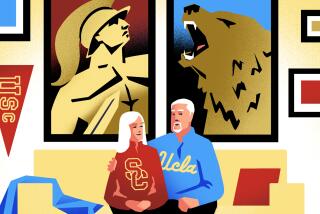Davisâ Friends Fall Away, Ambition Endures
Running the state of California keeps Gov. Gray Davis far too busy to make time for things that no longer matter--such as staying in touch with old classmates.
That is one theory among Davisâ former fraternity brothers at Stanford. Another holds that Davis is too guarded about his image to maintain ties with the rabble-rousers of Zeta Psi, an âAnimal Houseâ whose pledges liked to dump water from the roof onto unsuspecting coeds, and whose antics ultimately got the fraternity kicked off campus soon after Davis graduated.
For whatever reasons, a number of ex-classmates who were among Davisâ best friends during the wild mid-1960s now consider themselves cut off from the 59-year-old governor. Phone calls go unheeded. Handwritten notes are answered with form letters. They watch the man on television--his hair now gray but still perfectly coiffed--and they see only a stiff, impenetrable facade.
âHeâs a cipher,â said Nick Chickering, a former close friend who talks bitterly about futile attempts that he and other fraternity members have made in recent years to contact Davis. âEverything he does in life is to climb another rung on the ladder.â
Davisâ former friends are either alienated--in several cases--or largely consigned to the governorâs memory. Though he feels bad about that, Davis said, his priorities are now elsewhere.
âLife takes you in different directions--and, frankly, itâs all I can do to muster the energy to discharge all the responsibilities of this job,â he said.
Thousands of pieces of pending legislation, appointments, money to raise, campaign stops to make, the worldâs sixth-largest economy to run--those things all add up. âItâs hard to overstate the demands and pressures that a governor has to cope with.
âThey were great guys,â Davis said of his former classmates. â[But] you have to keep ... going forward in life.â
Davisâ attention to what matters now, to the endless calculations that shape the future, is obsessive and unwavering. It is his signature trait, the hard shell of a man seared by early disappointments.
The world might be fickle, unfair, war-torn, chaotic, but there was stability to be found in the spartan pursuit of achievement. Davis learned to filter out the extraneous, to channel his energies into the one man on whom he could most depend: himself.
Even in the political sphere, where relationships and personal promises often help define success, he holds himself apart, cultivating few real friendships, forming alliances that he maintains until they are no longer practical or useful. Nothing about him is charismatic or accessible.
âHeâs totally consumed,â said his wife, Sharon Ryer Davis, who tells a story about an encounter with former Gov. Pat Brown many years ago. The garrulous Brown demanded to know when they were getting married. Sharon surprised him by saying Gray was already married. âTo his work,â she told him. âHeâs married to his work.â
Davis married Sharon, too, in 1983. He and the former flight attendant live in a small West Hollywood condominium when Davis is not in Sacramento. Sharon, by far the more outgoing of the two, describes him as a typical working husband.
He flies home on weekends. He is an incessant watcher of baseball, football and âSportsCenter.â He likes action movies. Heâs a fastidious dresser. He runs late to meetings. Heâs a lousy driver but, thankfully, has a state-sponsored chauffeur. He loves golf but rarely finds time to play, except on vacations to Palm Springs.
Heâs even quieter at home than in public, she said, but in social settings he jokes and laughs easily. When they go out, she said, itâs usually with other couples they have met over the years at political gatherings and charity events.
âHe has an incredible sense of humor,â Sharon said in an interview. âHe doesnât mind the caricatures of himself being stiff.... He kind of accepts that. Heâs comfortable with who he is.â
Like Bill Simon Jr., his Republican opponent in the November race, Davis is a scion of affluence, the product of tough private schools and strict Catholic discipline. Born in the Bronx, N.Y., but raised mainly in Brentwood, Davisâ idyllic upbringing slammed to a close with two traumatic events: his alcoholic father, Joseph, abandoning the family for another woman while Gray was at Stanford, and Grayâs tour of duty in Vietnam.
How much those events shaped the young governor-to-be is hard to gauge. Davis is not one to reflect publicly on such deeply personal matters. In a 20-minute telephone interview that took more than a month to schedule, he glossed over the particulars of the estrangement with his father, but acknowledged that the rift lasted more than 30 years.
It was a painful fracture that ended largely by chance--in 1996--at a family wedding in New York where the two found themselves together. They reconciled and spent three days salving their scars.
Less than two months later, Joseph Graham Davis Sr. collapsed on a Florida golf course and died of a heart attack.
âIt rocks your boat,â Davis said of their shattered relationship and the splintering of the family. âThank God for bringing us back together.... Suffice to say, I loved him.â
Sharon believes the schism, during Grayâs sophomore year, coupled with many small disappointments that preceded it, strongly influenced Davisâ character. âI think it made Gray realize that was absolutely the person he would never be.â
Snide pundits like to cite âGrayâ as an apt nickname for so bland a person, but the original purpose was to distinguish father from son. âI didnât want a Big Joe and a Little Joe,â recalled Davisâ mother, Doris Morell, 79, who coined the nickname when Joseph Graham Davis Jr. was an infant. âOut of Graham, I got Gray.â
His temperament, even then, was exemplary, she said. âHe wasnât given to temper fits or screaming or any of that,â she said. âI thought, What are [young mothers] complaining about? This is easy!â
Gray would herald the way for five siblings: three boys and two girls. At a time when Norman Rockwell was still painting covers for the Saturday Evening Post, the Davises seemed a real-life embodiment of postwar innocence.
Doris, a stay-at-home mom, made sure that each child was tucked in at night, and that they said their prayers. Joseph Sr. was moving up the hierarchy at Time Inc., commuting into Manhattan before being asked to head a new ad office in Los Angeles as the company launched Sports Illustrated.
Relocating in 1954, the Davises settled in the Santa Monica Mountains near what is now the Getty Center. Not much existed there at the time, and the children missed their friends to the point that special vacation visits were arranged, Morell said.
Gray was 11, well-mannered, athletic, the type of kid who formed strong friendships but was rarely the center of attention. He was a huge fan of baseball and, in particular, the Brooklyn Dodgers, who would soon follow him West. Heâd had his picture taken with slugger Gil Hodges, a memento he proudly hung in his new bedroom.
One longtime family friend who met Gray in those days called him âan absolutely admirable young man. Youâd want your own son to be like Gray.â
Doris, an avid golfer who would claim several club championships, taught her son the game. Gray played regularly at the Bel-Air Country Club, winning a pair of junior titles before joining the golf team at Stanford.
Though Grayâs father also played golf, Joseph was a less reliable influence than the rock-solid Doris. The elder Davis was more likely to say, âYeah, Iâll be at your game today--and then not show up,â Grayâs wife said.
But his mother was dependable. Her belief in education and discipline governed the household. She enrolled Gray in the finest private school she could find: Harvard Military School (now Harvard Westlake Academy) in North Hollywood, then an all-boys institution where uniforms were mandatory.
A tough curriculum prepared the privileged offspring of attorneys, corporate founders and entertainers for Harvard, Stanford and other top-tier universities.
Davis excelled as an athlete and a student. He played on Harvardâs baseball and basketball teams and competed for fun in football, golf and tennis. His first attempt to make the baseball team ended in failure, resulting in a lecture from the coach. He had the talent, he was told, but not the drive. He had to apply himself.
The message got across. Davis worked on his game until he was good enough to be named captain.
âHeâs often told ... [people] that changed his life,â Sharon Davis said.
He would also graduate from high school magna cum laude.
âIf I got all Aâs and one B, my allowance was a dollar,â Davis once said of the rigid standards at home. âIf I got all Bs and one C, my allowance was 50 cents.â Lower than that, he stood to get nothing.
Chores and attendance at church were factored into the allowance equation. Rooms had to be picked up. His mother posted a chart in the kitchen: âGold stars, silver stars, red stars,â she recalled. âA bad job would be an X.â For an X there would be fines. âI had them buffaloed,â she said. âYou have to have some leverage.â
As a young man, Davis readily obeyed. At worst, Davis was âinclined to leave a sock where it dropped,â Morell said. Fresh-faced, with a brush cut, tie and military bars on his breast, he looked and acted the good soldier.
Midnight would roll around and Gray would often be up, finishing homework. He was enough of a hustler to trade on his academic talents.
âHeâd say, âIâll translate [your] Spanish if you polish my shoes,â â said Dede Ross, a sister two years younger who remains close to him. Gray was not above pulling pranks, she said. Heâd pin her down, making her laugh. âHeâd say, âAs soon as you stop laughing, Iâll get up,â â Ross remembered. Yet the other side of Davis, the deliberate, carefully controlled part of him, was already dominant.
âIt would take him an hour to blow-dry his hair,â Ross recalled. At the cusp of young adulthood, Davis let his thick, brownish-blond hair grow in something of a pompadour. âOne New Yearâs Eve he was going out,â Ross said, âand he took so long to get his hair done he missed New Yearâs. He took so long it was past midnight.â
Davisâ fastidious manner earned him another nickname at Stanford: âWoogie.â Woogie is a vague term as used by ex-members of Zeta Psi, but it stood for the Ivy League look--golf shirts and slacks--at a place given to jeans and T-shirts.
Woogie suggested the perfect Davis posture, a certain air he possessed. He was popular, but also someone to be teased. He generally took the razzing with good humor, said Richard Ashby, a former fraternity mate who played with Davis on the golf team.
The hair was one target. âIt was puffed up, sort of like it looks today ... [and] it looked like he was putting hairspray on it,â Ashby said. âYouâve got to remember, this was the early â60s. He spent an inordinate amount of time combing his hair.â
On the golf course, Davis was known to endlessly grip and re-grip his club, much as he would later dawdle over bills and appointments. âHeâd take 20 minutes to take a shot,â Ashby said. âWeâd say, âCome on, Gray, hit the damn golf ball.â He was an excellent golfer and could have been a lot better, but his time was spent studying. He was serious, whereas most of these other guys ... were there for a party.â
Pledging at Zeta Psi seemed an unlikely thing for Davis to do. The house was populated by athletes, and Davis gravitated to it because of his golf and because a number of friends from Harvard Military School had gone, or were going, there.
To most who entered, the house was a venue for one long, wild bacchanal. Davis never quite seemed to fit. Sometimes he joined in the high jinks, sometimes he tried to talk sense into his frat brothers. He took part in pranks and was the target of pranks.
Ashby remembered one occasion when four or five guys, Ashby included, grabbed their surfboards and headed for Santa Cruz in Davisâ car, a stripped-down, fire-engine-red Chevy. Not only did they neglect to get Grayâs permission, they lost the keys, had to hot-wire the car, and were gone past nightfall. It didnât take Hercule Poirot, with the surfboards gone, to figure out where the car was.
âHe ended up calling the police on us--âstolen automobile,â â Ashby said. âHe probably had a date or something. We just thought, âMy God, Gray.â So heâs always been big on law enforcement.â
Racial unrest, the Cold War and the escalating conflict in Vietnam were beginning to germinate seeds of activism on college campuses in the early 1960s while Davis was at Stanford, yet few at Zeta Psi delved deeply into political affairs.
Two of the most serious members of the house were Davis and then-roommate Peter Collis, who would later serve as Assistant Secretary of Defense for Medical Readiness during the Persian Gulf War.
As Collis remembers, Davis talked little about South Vietnam, then the location of initial U.S. Special Forces operations. He showed no inclination toward protest, but was galvanized by the Cuban Missile Crisis of 1962, which thrust the nation to the brink of nuclear war.
Davis, a history major who would go on to law school at Columbia, âtook part in all the [campus] events just like everyone else,â Collis said, citing in particular the dumping of water on legions of unsuspecting female freshmen. âAnd [we] managed to stay out of trouble, always, by the skin of our teeth.â
While he was making his way through Stanford, however, Davisâ family was disintegrating. News of the divorce reached him in a letter. He soon learned the magnitude of his motherâs problems: His father had run up bills. Collectors were calling.
The sudden financial straits threatened Davisâ enrollment at Stanford; he was forced to take a job busing tables, and joined ROTC for its monthly stipend. Meanwhile, his mother decided to leave her friends and her beloved Bel-Air Country Club, and return East to Rye, N.Y., where her sister lived.
Divorce in the 1960s carried more stigma than today, especially among Catholics. Davis sided with his mother. He wrote off his father as if he never existed, and attended law school a short drive from his motherâs new address.
She would later remarry, as would Joe Sr., though not to the woman he had left home for. No one can say whether Davis, once burned, became quick to sever ties, or that he found reason to distance himself from the carousers he had known.
Certainly, Davis grew no less serious after dealing with lifeâs harsh realities. He seemed to be on a mission, as one ex-fraternity brother put it. Davis left the Zetas, and during his final two years at Stanford he rented a home away from the hubbub with Dick Hillman, a studious friend he had known since Harvard Military School.
Hillman, who owns an investment firm, remembered âsitting around, like young adults do ... having a couple of beers, and he was very clear: He said, âI want to be president of the United States.â
âI donât think anything at Stanford or his home life shaped him,â Hillman added. âIt was him who shaped him.â
Davis said the idea of entering politics really seized him only after he returned from Vietnam, but there is evidence that he was setting himself apart even as a member of Zeta Psi. Packed away somewhere, said wife Sharon, is an old photograph of a toga party.
âAnd everybodyâs in a toga except for him,â she said. âHeâs wearing jeans and a white shirt. Itâs quite amazing. Itâs almost as if he knew--he was not going to be photographed in a toga. But how does he know?â
More to Read
Get the L.A. Times Politics newsletter
Deeply reported insights into legislation, politics and policy from Sacramento, Washington and beyond. In your inbox three times per week.
You may occasionally receive promotional content from the Los Angeles Times.










